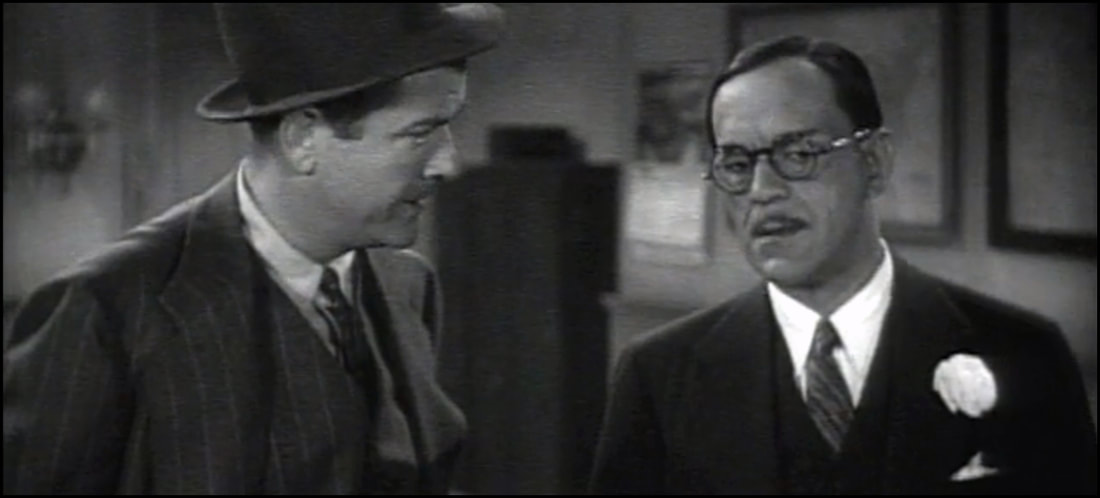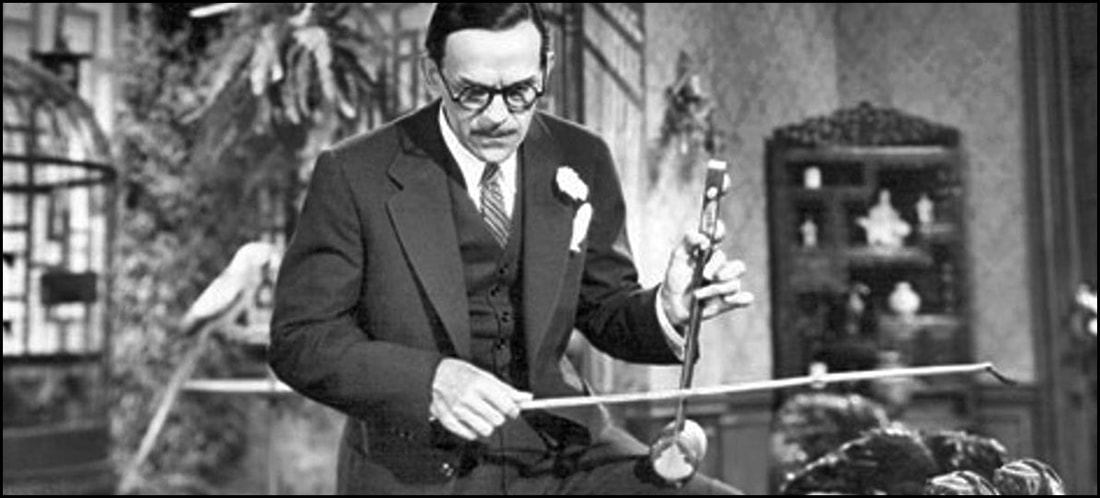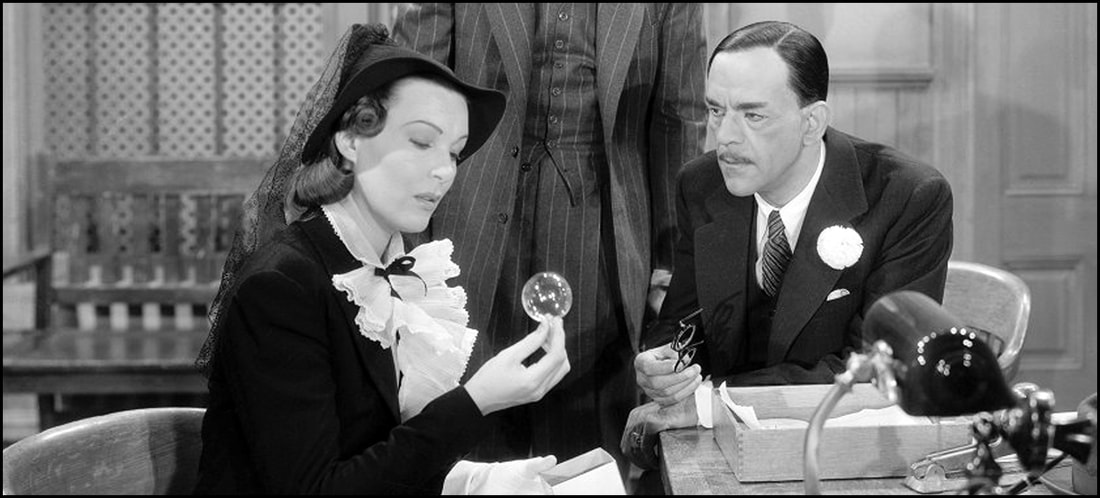Having mentioned many, many, many times in this space that I grew up in the days where all a household had for entertainment was a television set with a mere eight or nine channels, I can tell you that the films of Mr. Wong were a part and parcel of a nearby broadcast affiliate package. In fact, I can remember the small town, middle American TV host who kinda/sorta excitedly introduced the first one, mostly because the guy clearly was a Boris Karloff fan and was kinda/sorta tickled pink to be ‘premiering’ a rarely seen Karloff picture for whatever small audience the channel had. The thing is that this host had obviously no idea that the Wong series of motion pictures was not ‘the usual fare’ from ‘Karloff the Uncanny,’ meaning this was not a monster movie or a horror film in any stretch of the imagination. While the viewers were never treated to the host’s thoughts after the picture had been aired, I still can picture the guy’s private disappointment.
Now, this is in no way, shape, or form meant to imply that Mr. Wong, Detective is a bad film. As you’ll see by the finish of my review, I think it’s a suitable picture, one that balances the responsibilities of launching an all-new theatrical detective series along with delivering a good story capably enough. My issues with it lay more so in the former than the latter, which I think it could’ve used a bit more polish to be an effective introduction to the Chinese sleuth created by author Hugh Wiley and originally appeared serialized in magazines. In fact, one could argue that having Karloff in the lead role might be one of the things producers really got right, as his popularity with audiences likely buoyed the pictures’ prospects more than any other single element could’ve hurt any momentum.
From all I’ve come to know, the 1930’s was a curious time at the domestic box office. Horror films – the kind of which Karloff, other actors, and studios had built solid returns upon – had kinda/sorta fallen from their perch of fame; and the producers were scurrying to find a new trend with which to draw audiences into theaters. As detective stories – and our never-ending cultural fascination with crime, it would seem – had grown wildly fashionable and successful in print form, the studios launched their respective bids to bring some of that cerebral action to screens. Metro-Goldwyn-Mayer had their Thin Man series. Columbia Pictures galvanized some interest with The Lone Wolf Returns in 1935. Fox Film Corporation began solving crime with Charlie Chan Carries On (1931). Twentieth Century Fox hired Mr. Moto to police their prospects.
And this left James Lee Wong – aka Mr. Wong – to headline efforts on behalf of Monogram Pictures, a notorious low-budget studio that delivered, mostly, a slate of quieter and less expensive fare. If crime doesn’t pay, then perhaps Monogram was in the right time and the right place to exploit such dark deeds captured on celluloid, and perhaps Karloff was the right man at the right time and in the right place to bring the literary investigator to life.
(NOTE: The following review will contain minor spoilers necessary solely for the discussion of plot and/or characters. If you’re the type of reader who prefers a review entirely spoiler-free, then I’d encourage you to skip down to the last few paragraphs for the final assessment. If, however, you’re accepting of a few modest hints at ‘things to come,’ then read on …)
“When a chemical manufacturer is killed after asking detective James Wong to help him, Wong investigates this and two subsequent murders. He uncovers an international spy ring hoping to steal the formula for a poison gas being developed by the first victim’s company.”
Yes, yes, and yes: I know, folks, that I do tend to overthink many, many films, but I’ve always thought that there’s a method to my madness. I like features to not only make perfect sense but also to tell me a story worth my time and investment. Rarely do I just sit down to merely disappear into a particular flick – when I do, it’s usually an old black-and-white I’ve seen more than a few times before so that I know going in that I can turn the brain off – so an experience with something like Mr. Wong, Detective can be a little taxing here and there. It’s the first in a series, and I expected it to do a bit more with its lead investigator than it really did.
In fact, the film opens with, basically, the presentation of James Lee Wong being considered a great thinker, mover, and shaker … and we’re never really given anything of substance with which to either accept such a title or establish our agreement with such praise. Director William Nigh and screenwriter Houston Branch (tasked with adapting characters and ideas from the Hugh Wiley serial) pretty much as audiences to just take all of this at face value, only providing a few modest hints at Wong’s background and how he came to attain such a reputation. Call me a fool, if you must, but I require a bit more than just a narrative blurb here and there. I prefer greater context, but that’s exactly what’s in short supply across much of Wong’s 69-minute run time.
Some of this clunkiness is likely owed to the way films of a certain era worked. Not a lot of time was spent on crafting screen characters as studios – more often than they should’ve – relied heavily on a star’s established status to serve as the chief draw. Boris Karloff – known chiefly for his (epic) work in Frankenstein (1931), The Mummy (1932), and The Bride Of Frankenstein (1935) among other frights – represents a curious choice to build a franchise centered on investigating the dark deeds of men and women, a vastly more cerebral process for players and audiences alike. As the film unspools, Wong is most definitely a thinker – not much of a talker – as the story shows him going about the tasks of exploring crime scenes, searching homes, and following leads; and far too much time is wasted with the man observing action instead of leading it.
Still – in typical detective style – Karloff is afforded the opportunity in the last reel to make sense of it all. Like Sam Spade, Mike Hammer, and Philip Marlowe, Wong always gets the last word as the lead character finally spills the beans to justify not only why he stayed somewhat in the background but also allowed the guilty culprits to inevitably bite off more than they could chew. He explains away any loose threads and dismisses red herrings, rising up and showing in pretty grand fashion why audiences wait for these moments in every screen mystery. In standard theatrical fashion, Karloff relishes these moments (or we relish him in them, I should say), and the day is saved for Wong to sit back, enjoy a cup of tea, and ponder what awaits him – and us – in the next adventure.
As our understated but heroic lead, Karloff is good, not quite grand here. (I found his work better in the next two pictures, honestly, but I’ll leave those remarks to those reviews.) His make-up is a bit off-putting in a few spots – a close-up here and there should probably have been avoided – but it works well enough as intended. (Do today’s social justice warriors resent the fact that a non-Chinese actor played an obviously Chinese role? I certainly hope that’s not the case, but film history is what it is, and I’ll not change it.) Grant Withers shares the screen affably in the guise of police captain Street, but – again, in customary Hollywood screenwriting fashion of the day – he’s relegated to far too many inferior scenes involving arguments with his gal pal Myra Ross (the lovely Maxine Jennings) wherein male/female sparring just goes nowhere comfortably. The rest of the cast kinda/sorta just blends together, sadly, as the spy plot is a murky focus, mostly serving as a distraction from the central murder mystery that never quite effectively conceals an all-too-obvious culprit from the film’s opening scenes.
What does resonate, though, probably even to this day is Karloff’s portrayal. As Wong, he’s arguably one of the finer gentleman sleuths of the era. Never angry or foppish with others, he might look the part of a dandy here and there – with his pronounced lapel flower and umbrella on his arm – but he’s always kind, respectful, and patient with those around him, even at his own peril. He’s polite to the good and evil men and women alike – even when disrespected – and maintains an even keel in the face of danger precisely because he apparently knows that reasoned minds ultimately prevail. Why, he’s even the face of C.S.I. – the popular TV series – investigating clues, testing theories, and following the evidence when his onscreen counterparts just wish for a few minutes alone with a suspect to coerce a confession. I suspect this warmed the hearts of audiences of the day, and it might be one of the single greatest reasons to discover the Wong series nearly a century after it was first screened.
Mr. Wong, Detective (1938) was produced by Monogram Pictures. DVD distribution (for this particular release) is being coordinated by the good people at Kino Lorber. As for the technical specifications? While I’m no trained video expert, I found the sights and sounds on this Blu-ray disc to be mostly good to above-average: there’s a fair amount of grain, and the black-and-white balance could definitely go for a remastering, though I’ve no idea if some of these flaws are owed to an inferior source. Lastly, if you’re looking for special features? The disc boasts an audio commentary from film historians Tom Weaver and Larry Blamire though – if I’m correct – Blamire only appears sparingly and via recording: Weaver essentially hosts the affair, and he does an affable job delivering not a whole lot of movie-specific details but instead covers the series along with an exploration of notable cast and crew. It’s a good track, one designed to get a few laughs. So … meh.
Recommended.
Without getting too deep into the weeds of an ongoing film series, I can say that – having watched three of the five flicks available in this set – the second and third features are a bit more inviting and interesting than was Mr. Wong, Detective (1938). As a set-up, I think Houston Branch’s script tries a bit too hard in too many places to both create tension and flesh out primary and secondary characters, leaving Wong far too often reacting to action instead of delivering a commanding lead. When Karloff is given more to do and treated like the star of the show, the production simply flows much more naturally. So bear with this intro to this character and his world and you’ll be rewarded for your patience.
In the interests of fairness, I’m pleased to disclose that the fine folks at Kino Lorber provided me with a complimentary Blu-ray of their Boris Karloff: Mr. Wong Collection by request for the expressed purposes of completing this review. Their contribution to me in no way, shape, or form influenced my opinion of it.
-- EZ




 RSS Feed
RSS Feed